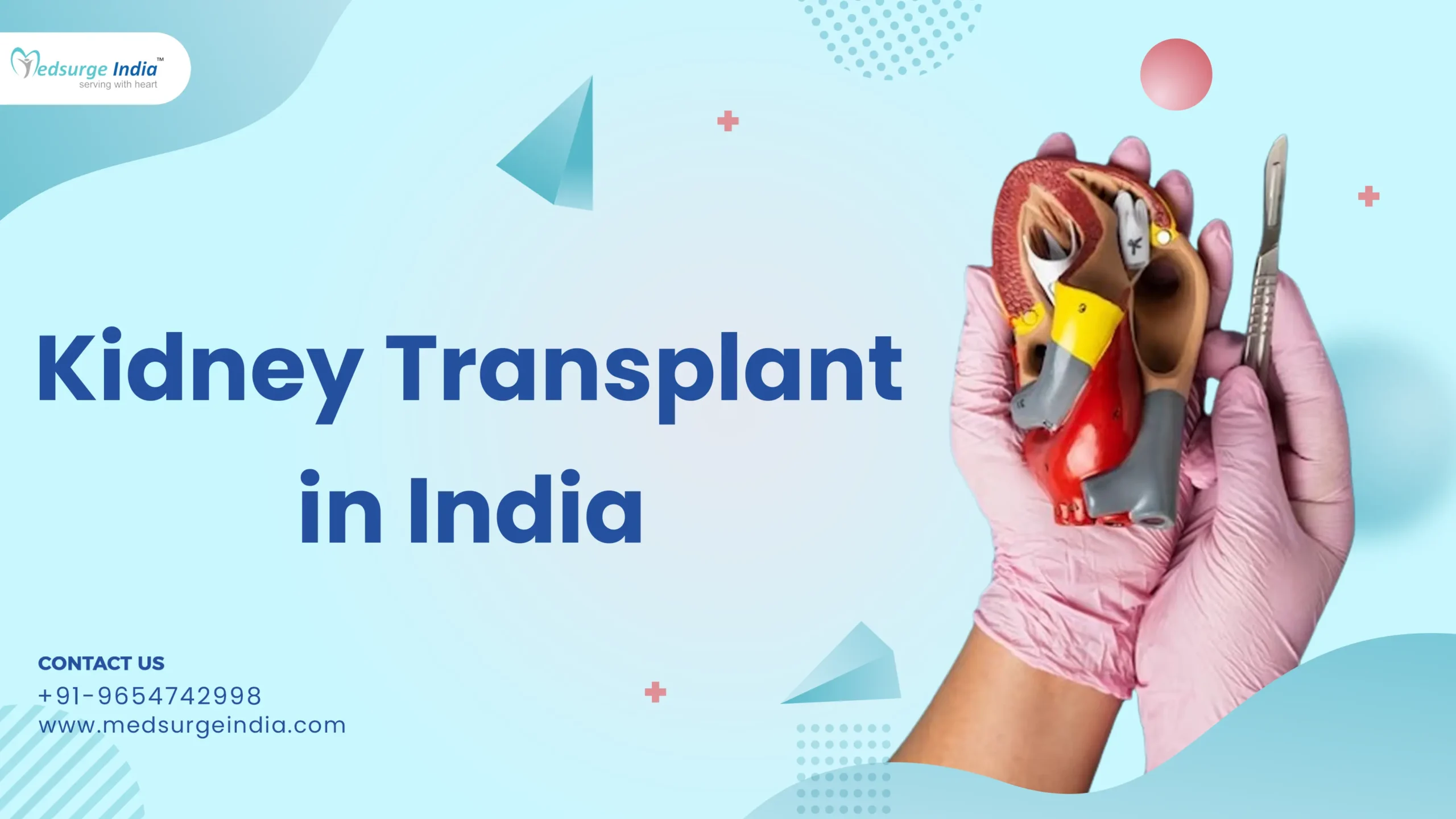
Kidney Transplant in India
A kidney is a vital organ of the human body, responsible for filtering waste and toxic substances and eliminating them from the body. A kidney transplant is a surgical procedure used to replace a patient’s damaged or malfunctioning kidney with a healthy kidney from a deceased or living donor.
People with kidney disease are usually treated with dialysis in order to survive. But for some people, kidney transplant is the only option if their kidneys have entirely failed. To replace two failing kidneys, just one healthy kidney is needed. This allows a living individual to give a kidney to a patient suffering from end-stage renal disease.
An Overview of Kidney
The kidney is a bean-shaped organ, about the size of a fist, located on each side of the upper abdomen. Humans have one pair of kidneys, their major function is to remove waste, toxic substances, and fluids from the body. They also maintain electrolyte balance in our body and produce hormones to regulate blood pressure.
When the kidney loses its ability to function, fluids and toxic substances start accumulating in the body. This elevates blood pressure and causes further complications. If not treated, it will lead to end-stage renal disease (ESRD), when the kidney could not perform most of its function.
Diseases That Lead To Requirement of Kidney Transplant
Kidney failure can occur due to various reasons. Kidney transplant becomes an option for those people who lose more than 90% of their kidney functional capacity. 60% of people who have kidney transplant in India are due to chronic kidney diseases. Common reasons that leads to the requirement of kidney failure are:
- Hypertension.
- Type 2 diabetes.
- Glomerulonephritis.
- Polycystic kidney disease.
- Severe defect in the urinary tract.
Symptoms of a Kidney Failure
The signs and symptoms of kidney failure will vary depending on the underlying causes and the severity of the condition. During the initial state, the patient might not experience any symptoms, however, the symptoms will become more pronounced as the disease progresses. Common symptoms are:
- Severe and persistent itching on the skin.
- Muscle cramps and weakness due to electrolyte imbalance.
- Shortness of breath due to pulmonary edema.
- Fatigue due to the build-up of toxins in the body, as the kidney fails to filter the waste product from the body.
- Insomnia and sleep disturbances.
- Problems in the bone and joint due to imbalance of calcium and phosphorus in the body.
- Swelling (edema).
- Anemia due to a decrease in the production of erythropoietin.
- Hypertension.
- Hyperkalemia.
- Excessive thirst and frequent urination.
- Reduce urination or changes in the color and odor of the urine.
Eligibility Criteria For Kidney Transplant in India
A person with end-stage kidney disease is always considered to be eligible for a kidney transplant in India. However, there are certain criteria that need to be met by every person who considers having a kidney transplant in India. A person must
- Have good overall health condition to undergo the surgical procedure and to withstand the follow-up lifelong medication.
- Willing to follow the doctor’s advice and instructions properly.
- Not failing to take the prescribed medications.
- Be possibly free from other diseases such as cancer, hepatitis, liver and cardiovascular disease, tuberculosis, bone infection, etc.
- Must quit smoking and drinking as well as other drugs.
People with chronic diseases, who have mental illness, and old age people are unlikely to be eligible for kidney transplant in India as the operation is not likely to have a successful outcome compared to those who meet the eligibility criteria. The doctor will examine and evaluate first to ascertain whether an individual would be a suitable candidate for a successful kidney transplant or not.
Requirements For Kidney Transplant in India
India has the second-largest live kidney transplant program worldwide. The toughest part of the kidney transplant process is to find a donor. There can be two types of kidney donors, a living donor and a cadaveric donor.
- Living donor: Since people can live a normal life even with just one healthy kidney, it is quite common for a family member or a friend to donate their kidney to the patient. This is also preferable as there are fewer chances of organ rejection from the recipient since it will be quite a good match with the donor.
- Cadaveric donor: In this case, the kidney is obtained from a deceased person. The number of kidney transplant in India through cadaveric donations is quite low as there are only a few people in India who registered to donate their organs in case of accidental death. To address the issue, the government amended the legislation in 2011 and created a “required request,” which requires intensive care doctors to ask the deceased person’s family to donate their organs in the event of a brain death.
Finding a match is another important step in the process. The recipient’s blood type has to be similar with the donor’s blood type. There is a possibility of donation between an incompatible blood type but this will require additional care pre and post-surgery. It also increases the chances of organ rejection.
HLA (Human Leukocyte Antigen) typing is another test to be performed if the donor and recipient have a matching blood type. This test looks for genetic markers that will raise the likelihood that the patient’s donated kidney will operate well in their body. If the tissue types match well, the new kidney will not be rejected by the body.
Tests and Diagnosis Necessary For Kidney Transplant
To make sure you are well and to learn more about your kidney status, a number of tests and procedures will be carried out before and after your kidney transplant in India. These consist of:
- Chest X-ray
- Renal nuclear scan
- CT scan
- Magnetic resonance imaging
- Kidney transplant ultrasound with Doppler
- Blood group incompatible kidney transplantation
- Kidney biopsy
Kidney Transplant Procedure
The kidney transplant procedure is always conducted under general anesthesia. The patient is carefully monitored by a surgical team including surgeons, anesthetists, and nurses.
- An incision is made on the lower part of the abdomen.
- The donated kidney is placed inside.
- The blood vessels of the new kidney are attached to the blood vessels of the lower abdomen.
- Also, the ureter of the new kidney is attached to the bladder of the patient
- The damaged kidney will not be removed and will be left in its original position unless it causes pain, infections, hypertension, or other complications.
- The patient’s heart rate, blood pressure, and blood oxygen level is continuously monitored throughout the process.
The patient will have to stay at the hospital until the surgeon considers him/her fit enough to be discharged. After that, it will be followed by multiple check-ups during the recovery period. Patients having kidney transplant in India are generally prescribed a lifelong medication of immunosuppressants and antibiotics.
Best Hospitals for Kidney Transplant in India
- Fortis Hospital, Bangalore (Bannerghatta Road)
- Medanta – The Medicity Hospital, Gurgaon
- Fortis Hospital Gurgaon
- Manipal Hospitals Dwarka, Delhi
- Apollo Hospitals, Greams Road, Chennai
- Indraprastha Apollo Hospital New Delhi
- Kokilaben Dhirubhai Ambani Hospital Mumbai
- Global Hospital Chennai
- Manipal Hospital (Old Airport Road) Bangalore
- Max Hospital Saket, New Delhi
Risks Associated With Kidney Transplant
A kidney transplant is a major surgery and is a serious procedure that needs to be done with extreme care and precautions. Like all other places kidney transplant in India also come with certain risks including:
- Reaction to anesthesia.
- Internal bleeding.
- Formation of blood clots.
- Infection.
- Organ rejection.
- Failure of the donated organ.
- Blocking or leaking of the ureter.
- Heart attack.
- Stroke.
Conclusion:
Going through a kidney transplant procedure is mentally and physically challenging. Patients need to be provided with the utmost care while going through the process. Many patients consider having a kidney transplant in India because of the exceptional services offered. Also, the price charge for kidney transplant in India is much lower and reasonable as compared to other countries. Also, the success rate of kidney transplant in India is around 95% which is very high. However, keep in mind that when it comes to making a decision about kidney transplant surgery, it is always best to listen to the advice of an expert. Make sure to talk with your healthcare provider and families before making any critical decision.
Kidney Transplant FAQs:
Q: What Is The Typical Duration of Kidney Transplant?
A: Generally, kidney transplant in India usually last for two to three hours. The procedure is always carried out under general anesthesia.
Q. What is the Cost of a Kidney Transplant in India?
A: Affordable Kidney Transplant cost in India starts from Rs. 10,83,000 (13,000 USD) and is comparatively low as compared with other countries even though India is one of the best medical tourism countries in the world.
Q: Do I Need To Fast Before Kidney Transplant Surgery?
A: In the majority of the cases, the patients are not allowed to drink or eat anything prior to 8 hours before the surgery. Also, avoid having a heavy meal on the evening before the surgery. Your surgeon will give you detailed information about what you can eat or drink, and how you should prepare.
Q: What Does Cadaveric Donor Means? How Can a Dead Person Kidney Function After Transplantation?
A: Cadaveric donors means deceased donors who have died either due to an injury or an accident. When a person dies, the heart continues to beat even after brain death, sometimes for several hours or even days, making it possible for the internal organs to function. During this period, the organ can be transplanted into the recipient’s body.
Q: Will The Transplant Kidney Functions Immediately After The Surgery?
A: This depends on how good the matching is between the donor and the recipient. Compared to a kidney from an unrelated donor or cadaveric donor, a kidney from a blood relative has a higher chance of functioning sooner. This is because the recipient’s body will take the new kidney more quickly and the family member’s kidney will fit the recipient’s blood and tissue type better. After surgery, a new kidney may begin to function the same day or it may take a few weeks.
Q: How Long Can Someone Live After Receiving a Kidney Transplant?
A: Following a kidney transplant, those in the 40–50 age range are assumed to have a life expectancy for approximately 22 years, while those in the 50–60 age it is expected to be 16 years. And somebody in their 60s can expect to live an additional 11.5 years following a successful kidney transplant.












